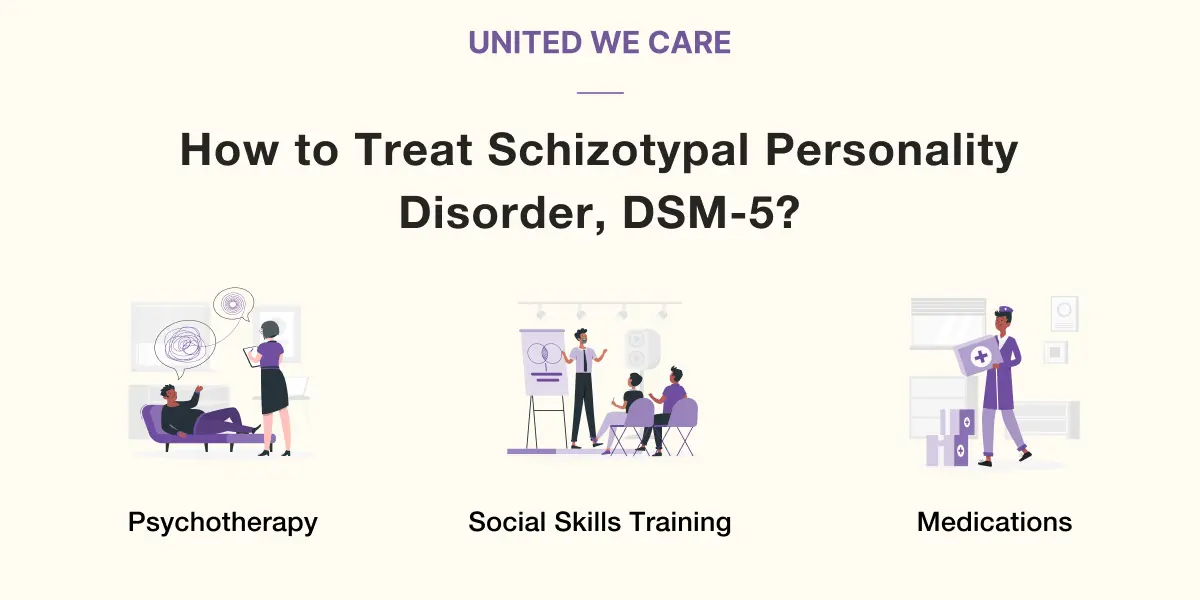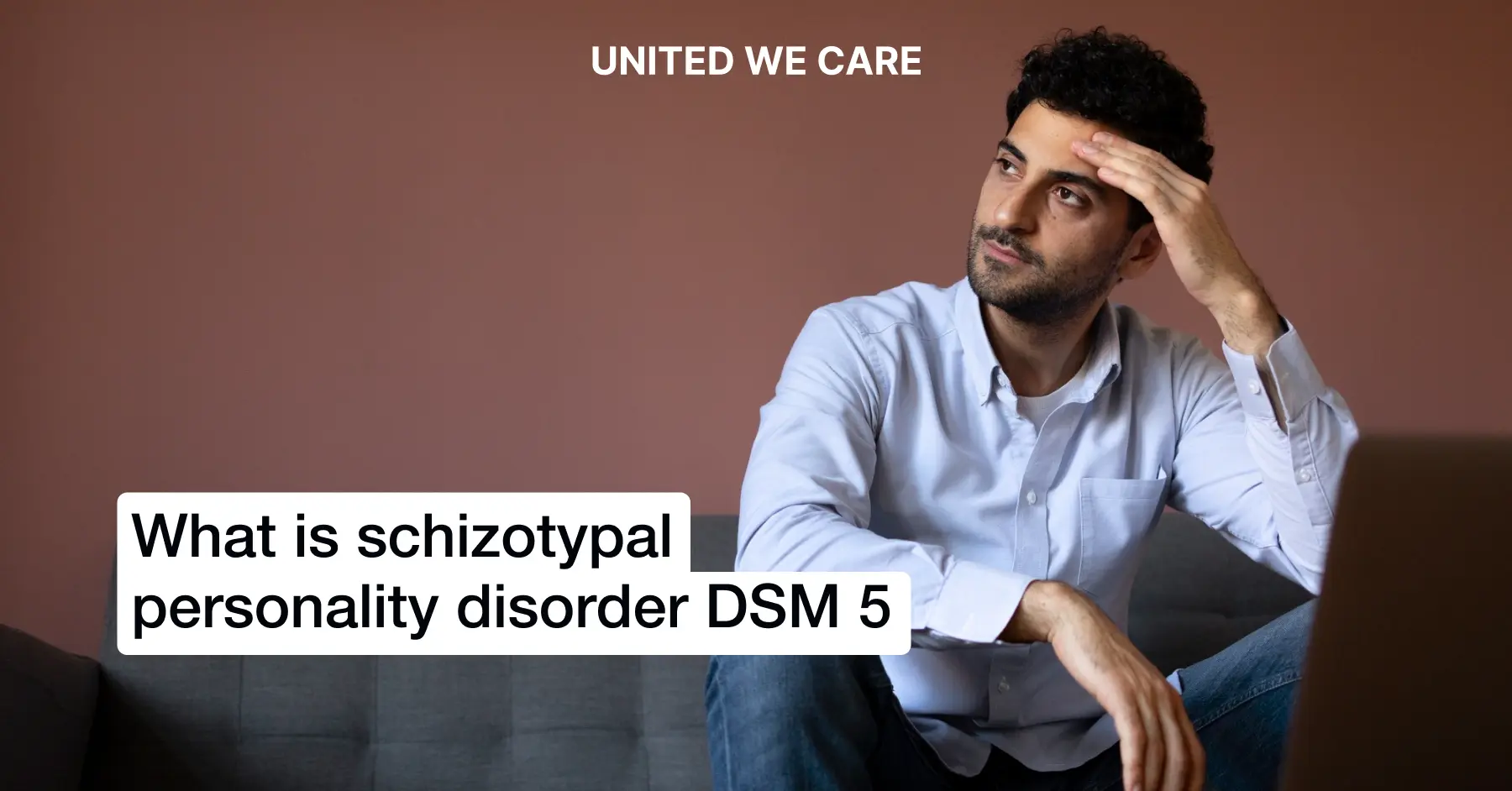Introduction
Unusual beliefs and ways of thinking are defined by a state of Schizotypal Personality Disorder. If one goes through uneasiness while practicing intimate relationships or even unique ideas or memories, it’s this disorder. The following article will describe Schizotypal Personality Disorder as per the DSM-5.
What Is Schizotypal Personality Disorder, DSM-5?
People diagnosed with this disorder usually present strange thought patterns and even behaviors. This might lead to a series of social challenges, like not being able to connect to reality and a differentiated cognitive landscape. Also, struggles with symbolic or metaphorical knowledge are noticed.
Schizotypal Personality Disorder is characterized by a basic struggle with trusting others, oversensitive stimuli, and behavioral practices that might be considered unfit as per society’s rules. Often, people with this disorder have trouble with constructing language patterns, observations, or anything that presents a concrete operation of thoughts.
According to the Diagnostic and Statistical Manual of Mental Disorders (DSM), this disorder is announced to be a personality disorder, as the name itself indicates. It poses challenges like the strange provocation of social anxiety, feelings of derealization, beliefs that are characterized as unconventional, and paranoia. Acknowledging these issues in order to address and treat them provides understanding and support along with prevention for people struggling with Schizotypal Personality Disorder.
Schizotypal Personality Disorder DSM-5 Symptoms
Due to strange behavior being included in this, it is counted under cluster A conditions as a personality disorder. In order to diagnose anybody with schizotypal personality disorder, one needs to look for the following signs:
Social and Interpersonal Deficits
These symptoms include;
- Ideas of reference
- Severe social anxiety
- Lack of close friends or acquaintances
- Absurd and doubtful thoughts
Odd Behavior or Speech
These symptoms include;
- Odd and peculiar behaviors or appearance
- Magical thinking, unnatural beliefs
- Vague or discreet speech
Unusual Perceptual Experiences
These symptoms include;
- Illusions
- Feeling absent things
- Belief in intuition or telepathy
Also, some behaviors might just look like a symptom before but can lead to an impact on important areas of function generation. This is often noticed in men and begins in the early adulthood stages of life. The specific reason for this disorder isn’t yet specific, but it might even be due to neurobiology or genetics. Yet, it is considered a part of the schizophrenia spectrum.
How to Treat Schizotypal Personality Disorder, DSM-5?
In order to treat schizotypal personality disorder, symptoms have to be managed, and functions should be enhanced at first. This can be achieved through modules like psychotherapy, social skills training, and medications.

Psychotherapy
In the process of psychotherapy, therapists guide the patient to get them through disintegrated patterns of thought. The base of it is built through cognitive behavioral therapy (CBT). It offers family or group therapy in which role-playing is included. This journey also looks forward to fighting irrelevant beliefs, extreme awareness, and creating logical explanations.
Social Skills Training
Reciprocal, conversational methods and a better understanding of social cues are worked upon in this social skills training. Interpersonal functions are also elevated, and non-verbal cues are strengthened by practicing these skills in the real world. This motivates the patient as well.
Medications
Wherever medication is required, antipsychotics or antidepressants are suggested for the help of a pharmaceutical arm. This deals with schizotypal disorder as the medications are adjusted to their needs. Risperidone, olanzapine, fluoxetine, or SSRIs are usually suggested, so side effects are also regulated and monitored. Through the management of psychotic symptoms, reduction in social anxiety, and stabilizing the mood, it helps. Also, all of this has to be managed under a psychiatrist’s guidance.
Therapy for Schizotypal Personality Disorder, DSM-5
In order to treat schizotypal personality disorder, psychotherapy can be an important guide. Here, Cognitive behavioral therapy (CBT) takes accountability for help by dissolving and transforming discrete forms of ideas and views. The therapist and patient, in collaboration, focus on strange ideas and behaviors along with their effect on relationships.
Being engaged in the practical application of effective interaction techniques, social skills, and role-playing is important. It not only elevates anxiety but also masters ways to communicate, like through body language or expressions. Under therapeutic guidance, group therapy helps through a supportive environment. Along with this, families make sure to acknowledge the patient’s existence while providing them with love and care.
For the ones looking for a safe space for a sense of validation and trust, individual therapy is the key. This collaboration between the clinicians and patients tries to make sure to question illogical behaviors or beliefs. Family therapy leads to healthy communication and coping mechanisms, while experiments and tools challenge assumptions and create new social approaches.
Conclusion
Schizotypal personality disorder, as defined in the DSM-5, is characterized by intense social discomfort, peculiar beliefs, and unconventional behaviors. Its approach toward treatment includes psychotherapy, social skills training, and even medications to deal with the symptoms. Through this strategy, you can acquire methodologies and tools to manage symptoms and enhance functioning to provide more advantages.
Even people with schizotypal personality disorder can lead healthy lives with proper treatment and guidance. But it doesn’t end with intervention as consistent follow-up care is to be taken care of to preserve the progress made. The therapeutic impact unfolds, empowers the patients, and prioritizes maintenance and regulation. This leads to the patients generating a meaningful life and connections in a way that they can endure life’s complex paths.
It’s okay not to know or understand; we are here to help you! Click United We Care to reach professional help right from the comfort of your home.
References
- American Psychiatric Association, “Schizotypal personality disorder,” in Diagnostic and Statistical Manual of Mental Disorders DSM-5, 5th ed. American Psychiatric Association, 2013. [Online]. Available: https://dsm.psychiatryonline.org. Accessed: Mar. 10, 2019.
- American Addiction Centers, “How to Treat Schizotypal Personality Disorder and Co-Occurring Drug Use,” [Online]. Available: https://americanaddictioncenters.org/personality-disorders/schizotypal. Accessed: May 15, 2022.
- Merck Manual: Professional Version, “Schizotypal Personality Disorder (STPD),” [Online]. Available: https://www.merckmanuals.com/professional/psychiatric-disorders/personality-disorders/schizotypal-personality-disorder-stpd?query=schizotypal%20personality. Accessed: May 15, 2022.
- National Institutes of Health, National Library of Medicine, “Schizotypal Personality Disorder,” [Online]. Available: https://medlineplus.gov/ency/article/001525.htm. Accessed: May 15, 2022.
- S. K. Kirchner, A. Roah, J. Nolden, and A. Hasan, “Diagnosis and Treatment of Schizotypal Personality Disorder: Evidence from a Systematic Review,” NPJ Schizophr., vol. 4, p. 20, 2018. [Online]. Available: https://www.ncbi.nlm.nih.gov/pmc/articles/PMC6170383/. Accessed: May 15, 2022.









